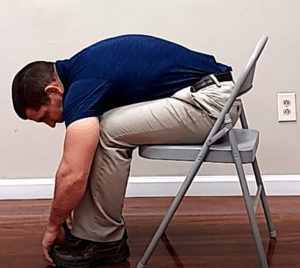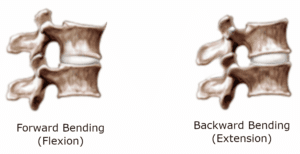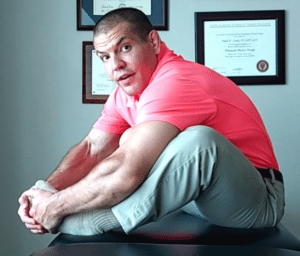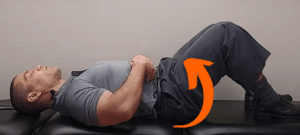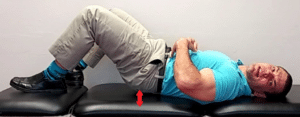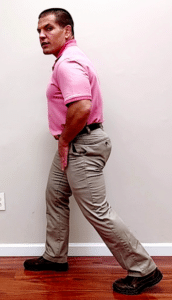Arthritis in the lower back, also known as spondylosis, degenerative joint disease, or facet arthropathy, becomes increasingly common as you age.
But spondylosis doesn't have to cause you pain or limit your function.
Watch the video below to learn 7 exercises for spondylosis to relieve lower back arthritis pain. With two exercises sitting, two lying down, and three standing, there's something for everyone.
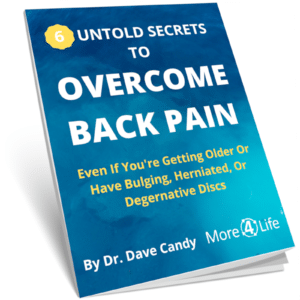
7 Spondylosis Exercises to Relieve Lower Back Arthritis Pain
These seven exercises are designed to relieve pain caused by spondylosis and improve your overall function.
You'll find two exercises you can do while sitting, two while lying down, and three while standing.
Whether you’re looking for immediate pain relief or long-term improvement, these exercises can help.
Seated Lumbar Flexion Exercise
This exercise is great for relieving pain quickly. Sit in a chair, on a couch, or at the edge of your bed. Scoot forward slightly and lean forward to flex your lower back.
When you forward bend, the spaces between the joints in your lower back open up, relieving pressure on the arthritic joints.
Seated Butterfly Stretch
Similar to the seated lumbar flexion, this stretch can be done on the floor, bed, or couch. Grab your ankles, pull them toward you, and lean forward into a deeper flexion.
This stretch helps open up the spaces in your lower back and relieves tension. You may also feel a gentle stretch in your hips or groin.
Supine Pelvic Tilt Exercise
The pelvic tilt is a very commonly prescribed exercise for people with spondylosis. While lying on your back (either on the bed, floor, or couch), pull your pelvis towards your ribcage to create a posterior pelvic tilt.
This strengthens your abdominal muscles and slightly flexes your lower back, which relieves pressure on the joint surfaces.
Bridge Exercise
After mastering the pelvic tilt, move on to the bridge. Start with a pelvic tilt, then push through your heels and gently raise your glutes off the floor, bed, or couch.
The goal is a slight lift to unload your lower back, not a high bridge.
This exercise strengthens the glutes and relieves pressure on your lower back.
Standing Pelvic Tilt Exercise
For people who experience lower back pain while standing, the standing pelvic tilt is essential. Standing with a neutral spine, perform a pelvic tilt to flatten the curve in your lower back.
Squeeze your glutes and slightly push your pelvis forward to further reduce the arch in your back, relieving the joint surfaces.
Hip Flexor Stretch
When walking, tight hip flexors can pull your lower back into an arched position, increasing pain. To stretch the hip flexors, take a step forward as if you’re walking.
Perform a slight pelvic tilt, squeeze your glutes, and push your pelvis forward until you feel a stretch in the front of your thigh. Make sure your lower back stays flat throughout.
Single Leg Balance
If your lower back pain is worse on one side, you may have a side-to-side muscle imbalance. Practicing single-leg balance helps improve stability.
Stand on one leg, squeeze your glute, and maintain a level pelvis. Switch legs and repeat. Over time, work up to holding this position for 10 seconds on each leg.
Additional Resources
If you'd like more exercises to improve hip strength and stability, check out our hip strengthening exercises video. For more back pain and sciatic relief tips, explore our back pain and sciatica playlist. Don't forget to like, subscribe, and stay updated with more tips on staying pain-free as you age!
Need Help For Lower Back Arthritis Pain?
If you have lower back pain from spondylosis or arthritis and would like to get rid of it, we'd be happy to help you.
Just tap the button below to request an appointment with one of our specialist physical therapists.



